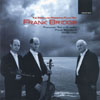Bridge Piano Trios
Eloquent accounts of rewarding chamber repertoire composed by a master of the form
View record and artist detailsRecord and Artist Details
Composer or Director: Frank Bridge
Genre:
Chamber
Label: Black Box
Magazine Review Date: 9/2000
Media Format: CD or Download
Media Runtime: 57
Catalogue Number: BBM1028

Tracks:
| Composition | Artist Credit |
|---|---|
| Phantasy |
Frank Bridge, Composer
Frank Bridge, Composer Roberts Trio (Bernard) |
| Piano Trio No. 2 |
Frank Bridge, Composer
Frank Bridge, Composer Roberts Trio (Bernard) |
| Miniatures (Set 2), Movement: Romance |
Frank Bridge, Composer
Frank Bridge, Composer Roberts Trio (Bernard) |
| Miniatures (Set 2), Movement: Intermezzo |
Frank Bridge, Composer
Frank Bridge, Composer Roberts Trio (Bernard) |
| Miniatures (Set 3), Movement: Valse Russe |
Frank Bridge, Composer
Frank Bridge, Composer Roberts Trio (Bernard) |
| Miniatures (Set 3), Movement: Hornpipe |
Frank Bridge, Composer
Frank Bridge, Composer Roberts Trio (Bernard) |
Author: Andrew Achenbach
It has taken more than five years for this enterprising anthology to reach the shops. Fortunately, the wait has been worth it: these are utterly sympathetic, beautifully prepared performances from this fine family group, whose line-up comprises the distinguished pianist Bernard Roberts and his two sons, Andrew and Nicholas (on violin and cello respectively).
The centrepiece is the Second Piano Trio, a truly magnificent creation that Anthony Payne has justly hailed as ‘one of the masterpieces of 20th-century English, indeed European chamber music’. Cast in two interlinked movements, it is a work of searing intensity and astounding individuality, whose November 1929 premiere provoked a shockingly ignorant and hurtful response from some quarters of the British musical establishment. Compared with the Dartington Trio on a rival Hyperion issue, these dedicated newcomers take a more restrained, less lingering view of this troubled music. Some will crave an altogether more palpable sense of numbing loss in the unnerving Andante molto moderato slow movement than the Bernard Roberts Trio chooses to convey; and the work’s towering final climax perhaps lacks that last ounce of cumulative power and epic breadth. No matter, this is a shapely, thoroughly convincing conception all the same, though I must say I’ve yet to hear an interpretation – on or off record – that comes close to matching the comprehensive emotional and intellectual response offered by the Tunnell Trio on a treasured and long-deleted Argo LP (a simply magisterial display, no doubt doomed to languish for an eternity in the vaults).
Winner of the 1907 Cobbett Composition Prize, the Phantasy Trio in C minor inhabits an entirely different world, its elegant arch-shaped form, superior craftsmanship and generous lyrical flow being typical of Bridge’s early output. The present group gives a splendidly taut, agreeably unmannered account of this lovely piece, and lavishes similarly deft and affectionate treatment upon four of the nine Miniatures for piano trio published in three sets between 1909 and 1915 (the opening ‘Romance’ is a particularly touching morsel). The sound is admirably vivid, though the piano timbre is perhaps just a touch clangorous. All in all, a most desirable acquisition.'
The centrepiece is the Second Piano Trio, a truly magnificent creation that Anthony Payne has justly hailed as ‘one of the masterpieces of 20th-century English, indeed European chamber music’. Cast in two interlinked movements, it is a work of searing intensity and astounding individuality, whose November 1929 premiere provoked a shockingly ignorant and hurtful response from some quarters of the British musical establishment. Compared with the Dartington Trio on a rival Hyperion issue, these dedicated newcomers take a more restrained, less lingering view of this troubled music. Some will crave an altogether more palpable sense of numbing loss in the unnerving Andante molto moderato slow movement than the Bernard Roberts Trio chooses to convey; and the work’s towering final climax perhaps lacks that last ounce of cumulative power and epic breadth. No matter, this is a shapely, thoroughly convincing conception all the same, though I must say I’ve yet to hear an interpretation – on or off record – that comes close to matching the comprehensive emotional and intellectual response offered by the Tunnell Trio on a treasured and long-deleted Argo LP (a simply magisterial display, no doubt doomed to languish for an eternity in the vaults).
Winner of the 1907 Cobbett Composition Prize, the Phantasy Trio in C minor inhabits an entirely different world, its elegant arch-shaped form, superior craftsmanship and generous lyrical flow being typical of Bridge’s early output. The present group gives a splendidly taut, agreeably unmannered account of this lovely piece, and lavishes similarly deft and affectionate treatment upon four of the nine Miniatures for piano trio published in three sets between 1909 and 1915 (the opening ‘Romance’ is a particularly touching morsel). The sound is admirably vivid, though the piano timbre is perhaps just a touch clangorous. All in all, a most desirable acquisition.'
Discover the world's largest classical music catalogue with Presto Music.

Gramophone Digital Club
- Digital Edition
- Digital Archive
- Reviews Database
- Full website access
From £8.75 / month
Subscribe
Gramophone Full Club
- Print Edition
- Digital Edition
- Digital Archive
- Reviews Database
- Full website access
From £11.00 / month
Subscribe
If you are a library, university or other organisation that would be interested in an institutional subscription to Gramophone please click here for further information.




